Peter MALONE
Saturday, 18 September 2021 19:22
Cat and Mouse/ Le Chat et Le Souris
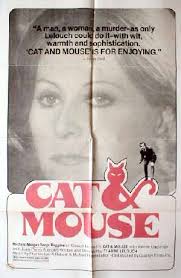
CAT AND MOUSE (LE CHAT ET LE SOURIS)
France, 1975, 108 minutes, Colour.
Michele Morgan, Serge Reggiani, Jean- Pierre Aumont, Philippe Leotard.
Directed by Claude Lelouch.
Cat and Mouse indicates stalking and playing and director Claude Lelouch, noted for his interest in love and marriage, crime, age, plays with his audience in a fragmented, time-shuffling, murder mystery that pleases, has some excellent individual sequences (frequently at meals), makes some social comment but lacks the inner intensity that it looks that it ought to have.
Michelle Morgan and Serge Reggiani, in their fifties, are admirable as the stars and the film relies on their strength, as well as their age, for its themes. But basically Lelouch is best working with the romantic variations on his 'Man and a Woman’ theme as he has been doing for so many years.
1. Audience interest in murder mysteries? The appeal of the deaths, motives, suspects, clues? The quality of this murder mystery and detection?
2. The contribution of the Gallic atmospheres, Paris, Normandy, the French Look, sound? Colour, music, atmosphere?
3. How important was the structure, the ordinary chronological details of the death and the investigation, the shuffling of time in memory and imagination, the slackness of the structure and its fragmented nature - was this deliberate or not?
4. The cage of the credits, the lift and the rising above Paris, the imaginative push by Mrs Richard? The introduction to her and to her husbands, their relationship, the mistress, the atmosphere of death and love? hatred? The husband’s belief that his wife loved him? How did this gear suspicions for the rest of the film?
5. What did the audience believe was the solution to the killing, the robbery? How much evidence was there? Opinion based on evidence? When did audience opinion change?
6. How important was Mrs Richard for the focus of the film? The quality of Michelle Morgan's performance, dignity, presence, age? The quality of the woman in being herself, her wealth and position? Her bearing, manner with people, for example, the servants, police? Was it possible that she killed her husband? Her being at the film, her reaction to his death and its seeming exaggeration, her reaction to the paintings, her behaviour at the funeral, the interrogation and the visualising of her memory and imagination? The question of the finance and the insurance? Her response to Lechat's visits? The discussions with him and the bond between them especially the sequences of eating together? Liking him? Her response to her son’s friend, lovers? The experience of the kidnapping and the shooting? The boat and the seeming solution? Her presence with Lechat at the interrogation and her reaction of Antoine and his wife, Manuelle? The scene showing her relationship with her husband, especially the meal and the discussion of divorce? How credible a character?
7. Lechat and the title of the film and its reference to him? First seeing him with the training of Sam, and Sam’s odd behaviour throughout the film - the comic touch? The bond with his assistant and his becoming his son-
in-law? Seeing him at the investigation, his theories and presuppositions? How strongly drawn was his personality? His relationship with the prostitute and going to Normandy with her and being disillusioned after a happy year? The bond with his daughter and their discussions? Audience response to his treatment of the counterfeiter and his taking his money and the justification of leading his assistant astray? His interviews with officialdom and the discussions about him and his being on the take? His work with timing the cab, the motor bike? The politics behind his pensioning? The bond between his son-in-law and daughter - and the meal? His work on the farm in Normandy, the writing of the book and his intuitions about the case? His continuing his investigations especially the interrogation of Daub, spying on Madame Richard, taking the painting, using the dog to terrorise people for interrogation? His quality in resolving the crimes?
8. The presentation of the murder situation - the personality and his explanation of his age, background, infatuation? The scenes with Manuelle? His work in films, the jewels for his wife, for Manuel? The scenes in which he reappeared for the meal, discussing divorce, with his son? The truth and the revelation of the suicide?
9. Antoine and his wife - the attention given to their characters and yet a distraction from the truth? Their presence but on the sidelines? The scene in the restaurant and audience suspicion of Antoine, the dog, his wife telling the truth and the flashbacks? The parallel with Lechat's treatment of the insurance man - the visits, interrogation, the visit to the racing track and the revelation about the kidnapping?
10. The portrait of Lachat’s assistant? A genial young man, learning his work from his father-in-law, admiring him? His surprise at taking the money? Hie lateness in arriving at the meal and the comic touches, the humour and atmosphere of the meal together and the transition to his marrying Lechat's daughter? His continued help?
11. The presentation of police methods - their presuppositions and theories, their freedom in movement, manner of interrogation? The points made about corruption leading to the revelation of political conspiracy for a left wing plot against the rich for political purposes? The character of Daub, the discussion with the minister, the plot and its repercussions? The irony of the use of the cigar scene and the minister circling?
12. Themes of marriage, liaisons, relationships between the young and old? The marriage of the Richards, their lovers? Lechat and the young prostitute, Manuelle and Richard, Robert? The ordinary marriage of the daughter and the policeman? Love, sexuality, as motives?
13.The world of wealth and fashion and the way it was presented?
14. The humour about the making of movies, the lady, the dog and the Rolls Royce, ‘in’ jokes?
15. The use of subjective shots, especially with the characters talking to the audience, hand-held camera, the circling of the camera on the car and the bike etc.?
16. How fashionable, modish, enjoyable? The irony of its being a mystery?
Published in Movie Reviews
Published in
Movie Reviews
Tagged under
Saturday, 18 September 2021 19:22
Case of Rape
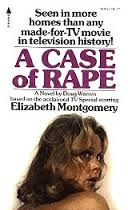
CASE OF RAPE
US, 1974, 100 minutes, Colour.
Elizabeth Montgomery, William Daniels, Cliff Potts, Rosemary Murphy, Ronnie Cox.
Directed by Boris Sagal.
A Case of Rape is a very hard-hitting American telemovie, made in the early years of the popular telemovies.
Elizabeth Montgomery had made her mark in a number of films as well as starring in Bewitched. After this she began to develop stronger television leading roles for herself such as the lead in a remake of the Bette Davis film, Dark Victory.
She is supported by regular television actors William Daniels and Cliff Potts as the villain.
The film is very strong in its visual presentation of rape – though geared towards viewing by an audience at home. It illustrates how strongly a film can be made while exercising reticence and not being exploitative. Elizabeth Montgomery portrays a housewife, happily married, who is raped, reports the case to the police and is forced to undergo humiliation as she is interrogated by the police, harshly treated by hospital staff, suffers in the courts and is then raped again.
The film raises the question of the victimisation of victims of rape – as well as pointing out that men can be accused by hysterical women. However, this film is a very strong opportunity for audiences to understand the impact of violation on a woman who experiences it.
I. How satisfying a telemovie was this? As entertainment? As instructive? why was the film made?
2. Did the film use telemovie techniques well? The use of close-ups for home viewing? sections with the ending for advertisements? Did this detract from the impact of the film?
3. How real was the story of this film? Is it verified by newspapers and court reports? Was it filmed in a realistic way? Were the situations contrived? The details, the relationships, the trial? Where were audience sympathies during the film? Did they veer from Helen?
4. What was the impression of the film as regards justice? How was the audience sense of justice appealed to? Did this add to the audience response to the film and colour it? Successfully, appropriately?
5. What did the film have to say about the reality of rape? Its effect on the woman herself, her stance with the law? the victim put on trial? The horror of the whole situation? Was this balanced by the necessary precaution of protecting the accused? The fact that men could be victimised by hysterical women? How did the film bring this contrast out? Successfully?
6. How was the character of Helen established as an ordinary housewife? With her good points and had? Her relationship to husband and family? to friends? The fact that she was victimised and her kindness was played on? Her fears after the first rape? Could you understand why she didn’t continue to call the police? The reality of the second rape? Why did she prefer charges? How strong was she in deciding to go through with the court case? Her agreement to suffer the humiliations? Was she motivated by revenge? By other motives? What impact did the trial have on her? The ordeal of living through it? Her relationship to her husband? How did this experience change her life? Was this justified?
7. What were your responses to Larry as a person? His style of encountering the women? His brutality in the rapes? The fact that he came back? his presentation in the court case? His seeming innocence? His reassurances to Helen at the end? What impact did this have on the audience’s sense of justice? How important was this for the film?
8. The picture of family life, its strengths and weaknesses? Helen’s inability to tell David? their visit to the family downstairs, the party and the pool, the comments on marriages breaking up? Was David’s point of view reasonable - his love and yet his suspicions? Trying to overcome repugnance and be sympathetic? His suspicions raised during the trial? Why was he unable to believe that Helen would tell the truth? Was his alienation from her understandable? Justifiable? What was your response to the information that they were divorced eventually?
9. Was the picture of the, police in the film justified? Was it accurate? humiliation of Helen? The sort of details of examinations, photographs, thee language about rape? Their questioning of Helen so as to protect the accused from hysteria? How necessary is this? reactions to it?
10. The importance of the court sequences? The busy courts, the juries and the way that they could be appealed to? The role of the judge and his attitudes? Would you have followed through as he did in having the case in court? Would she have been better to have withdrawn the charges?
11. The lawyers? Helen’s lawyer and his ability to help her? Did he do his best? How well was this illustrated? Importance of the accused having a woman? Did she overstep the bounds in her defence? How skilful a lawyer was she? the manipulation of the truth and the lack of truth? How frustrating was this? How repulsive? Seeing the two lawyers arranging a golf game the following week? response to this?
12. Assess the effect of the case on all those concerned. Who came out the worst? The importance of Helen sitting in the court and camera shifts?
13. Why is it important that the audiences have the opportunity to see this kind of dramatisation of real crimes? Why?
Published in Movie Reviews
Published in
Movie Reviews
Tagged under
Saturday, 18 September 2021 19:22
Castle, The/ Das Schloss
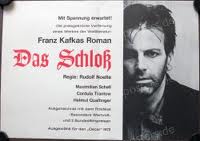
THE CASTLE (DAS SCHLOSS)
Germany, 1971, 88 minutes, Colour.
Maximilian Schell.
Directed by Rudolf Noelte.
The Castle is a version of a short story by Franz Kafka. Once again, as in The Trial, the name of the central character is K. He is also searching for a bureaucrat named Kramm, utilising once again the letter K.
This brief film shows a young man coming to a village. He is to be an attendant at the castle overlooking the village. It is winter, snowing, the villagers are suspicious and do not understand why the castle needs someone to look after it. However, the plight of the young man is that he has to find the bureaucrats – finding himself in a tangle of anonymous bureaucracy. This is a familiar theme from the writings of Kafka. There are various visuals of this kind of bureaucratic claustrophobia, rooms filled with files, surreal dreams as the man tries to find his place.
There was another film version of The Castle in 1997, a much longer version, directed by Austrian Michael Haneke (Funny Games, The Piano Teacher, Cache).
One of the most celebrated versions of a Kafka novel was Orson Welles’ 1962 version of The Trial. Other plays and works of Kafka, like Metamorphosis, have been adapted for television. A portrait biography of Kafka was made by Stephen Soderbergh in the early 90s with Jeremy Irons.
1. For what audience was this film made? Was it meant as popular entertainment?
2. That was the overall impact of the film? Interest. entertainment. puzzle. questioning about the reality of life and society?
3, Was the film obviously a fable? About what? How was the film an allegory? Of what?
4. How important for the film and its impact were colour, its village location, the focus of attention and the visualising on the castle?
5, What did the castle stand for? Its look? Its significance in the village? What is the castle a symbol for? What kind of authority? The relationship between royalty and the ordinary people? The anonymous person inside the castle? Unseen authority? Impersonal relationship? The ignoring of the individual? The tangle of bureaucracy and its effect on people's lives? How is the film a fable of authority? Society and the ordinary people?
6. Was the land surveyor a real character or merely representing Everyman? His ambitions and hopes? His being employed by the castle? His work, his search for identity and identification? The anguish when his ambitions began to elude him? The meaningless of his life because of the authorities in the castle? An allegory of the meaninglessness of life?
7. The significance of the mayor in the film? His explanation of the bureaucracy, the history of previous land surveyors, his impact on the land surveyor?
8, The importance of the bedridden official at the end of the film? The significance of his story? The meaning for the allegory? Its impact on the land surveyor?
9. The family and the other members of the village? The effect of the castle on them? Their effect on the land surveyor? An allegory of relationships within life? The castle and visualising the possibility of permanent relationships?
10.The significance of authority from the film? The role of the state, control, the disregard of the individual. totalitarian impersonality?
11.The importance of stories being told by the characters? As explanations of the puzzle? As contributing further to the puzzle?
12.How abstract was the meaning of the film? Were symbols important for the audience to grasp its meaning? The emotional impact of the plight of the land surveyor? The uncertainty of the ending?
13. Was it important that Kafka did not finish this work? In this way, is it a symbol of the meaning of the story? An unfinished ending? The frustration of impersonal and unknown ending?
Published in Movie Reviews
Published in
Movie Reviews
Tagged under
Saturday, 18 September 2021 19:22
Cast a Giant Shadow
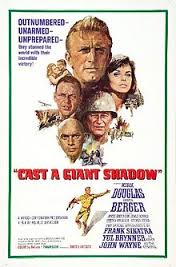
CAST A GIANT SHADOW
US, 1966, 146 minutes, Colour.
Kirk Douglas, Senta Berger, Angie Dickinson, James Donald, Stathis Giallelis, Luther Adler, Topol, Ruth White, Gordon Jackson, Michael Hordern, Alan Cuthbertson, Jeremy Kemp, Frank Sinatra, Yul Brynner, John Wayne.
Directed by Melville Shavelson.
Cast a Giant Shadow is an epic film made about the formation of the State of Israel. It was made less than twenty years after the establishing of Israel in 1948. (The formation of Israel and its aftermath was, perhaps, even more strikingly presented in Otto Preminger’s Exodus, 1960.)
This film is also the biography of real-life Colonel David “Mickey” Marcus. Marcus had trained as a lawyer, was involved in the politics of New York City with Fiorello La Guardia and presidential candidate Tom Dewey. During World War Two he reenlisted and was approached by Jewish authorities to lead the military aspect of the formation of the State of Israel. He accepted. The film shows the background of his family life, a relationship with his wife played by Angie Dickinson and an affair with his assistant played by Senta Berger.
The England are well presented by staunch character actors like James Donald, Gordon Jackson and Michael Hordern. There are also guest stars to enhance the box office popularity – an episode with Frank Sinatra, Yul Brynner who resembles the military leader Moshe Dayan and John Wayne appears briefly as a general who resembles General Patton. (The film was co-produced by John Wayne’s company, Batjac.)
Luther Adler who presides over the formation of the State of Israel represents David Ben- Gurion.
The film had difficulties in production – and Melville Shavelson, the director, wrote a critical humorous book later called How to Make a Jewish Movie.
The film represents attitudes towards the State of Israel in the 1960s – and, it is noted, that it was released at the time of the Six Day War. The film takes for granted the State of Israel – although it shows the neighbouring Arabs, especially the Palestinians, as hostile to the Israelis.
The film is interesting to look at in light of the history of tensions between Israel and the Palestinians and Israel and Lebanon.
Melville Shavelson normally wrote a lot of lighter films and directed a number of them including Bob Hope in The Seven Little Foys and Beau James, Danny Kaye in The Five Pennies and On the Double, Clark Gable and Sophia Loren in It Started in Naples, Sophia Loren and Cary Grant in Houseboat and Paul Newman and Joanne Woodward in A New Kind of Love.
I. The meaning of the title and its application to Marcus? The atmosphere of the credits? The style of this film, wide screen, colour, locations, booming music? a big film?
2. Although the film was a spectacular one, how serious was it in its intentions? How intelligent in its approach? Was it too romantic? Did it get to grips with its themes?
3. Was the film a just one? Did it present Arabs and Jews fairly? Did it present them fairly in the portrayal of the past? Its influence on the present? In what ways did it seem partisan? The importance of John Wayne's presence in the film: the ordinary American, the typical American confronting such a political and radical issue? The fact that John Wayne was convinced, therefore the American public for this film being convinced? Was this fair?
4. What kind of person was Colonel Marcus in himself? Was this clear from the film? His presentation as a person, the chip on his shoulder, the influence of the World War on his home life and relationship with his wife? As an American Jew and his acceptance of this? The quality of his successes, his loving war and its exploits, the choice of going to war and remaining at home with his wife, the quality of his love for his wife, wanting a child? The emotional turmoil which he also experienced in Palestine? The significance of his return from it? From Palestine to Emma? His wanting to be in charge of operations in Palestine? Or belonging to a cause, identifying with it, using his skill and achieving success? How successful a war did Colonel Marcus have?
5. How successful was Kirk Douglas’ portrayal of Marcus? in the war sequences and his daring, clashing with the General, his role in American politics, the approaches by the Jews and his responses to these? his skill for making plans, his experiences of the troubles in Palestine, his execution of his plans, his rallying the Americans to the side of the Jews, his courage? The irony of his resolving his problems and his death?
6. How well did the film integrate Marcus’s personal problems with his cause? His making a mark in the world, his chips and his emotional conflicts? Resolving the emotional problems with Magda and being ready for death and the irony of his death?
7. How well did the film portray Israel’s cause? The political background of Palestine, British occupation, World War II, the United Nations, Arabs and their attitudes towards Jews? Israel itself and its inception, the Jews during the war, the refugees and building up Israel, the defending of themselves with a cause, the importance of the land, Jerusalem? How war-mongering were the Jews and the Arabs? The division in Israel? The division amongst the fighters? The divisions amongst the Arabs? Marcus’ policy of attack and courage? The utilisation of youths, the number of deaths to achieve this cause?
8. What impression did Asher make? His role in Palestine and his skill in leading his fighting men? The stances he took about Israel, about Marcis? His stubbornness and yet his support? The role of Devid and his original approach to Marcus? His support of him and the campaign? Ram and his role with the forces? his daring in exploits? His role in the formation of Israel? The picture of Ben Gurion? As a leader figure, in his wisdom, his expression of the inadequacies of the Jews in building up Israel? The emotional scenes at the rally where America recognised Israel?
9. How was Magda a symbol for the fight of the Jews? her European background? War, her escape, her marriage and its unhappiness, yet fighting for a cause? her courage, yet her hysteria and fear? How attractive a person was she?
10. How well did the film use the contrast between Magda and Emma? In their relationship with Marcus?
11. The character of Talmadge? Frank Sinatra’s personality, a mercenary joining a cause for the money, his skill with the planes, his enjoyment of firing the soda fountains,, the irony of his death and its emotional force in the film?
12. The role of Abou and Topol’s performance? An insight into Arab relationships with the Jews? The shrewd Arab able to sum people up and situations and help? A touch of humour for the film?
13. The impact of John Wayne as the General? His typical performance during the war sequences, his role in post war Washington, his advice about the Jew (the memories of Dachau)? His influence in the Department of State? The fact that he appeared often in flashbacks and the impact of this?
14. The presentation of the British, their occupation role, the passport incident, the importance of the refugees on the beach and the British mercy and politeness, the Ambassador and the party and his influence?
15. How vivid were the pictures of raids? The armoured buses, the blowing up of the dump, the siege, the immigrants in the fields, the building of the roads, the decoying of the tanks, Jerusalem?
Published in Movie Reviews
Published in
Movie Reviews
Tagged under
Saturday, 18 September 2021 19:22
Cash McCall
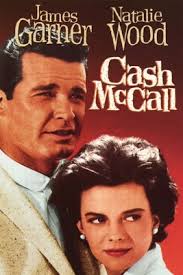
CASH McCALL
US, 1960, 102 minutes, Colour.
James Garner, Natalie Wood, Nina Foch, Dean Jagger, E.G. Marshall, Henry Jones.
Directed by Joseph Pevney.
Cash Mc Call is based on a popular novel, the type of novel that was popular around 1960 – glamorous, the world of big business, romance.
The film is an early star vehicle for James Garner who was emerging for a long career both on the small screen and the big screen. Natalie Wood had established herself as a child star and was now taking on more adult roles. Veterans Nina Foch and Dean Jagger as well as E.G. Marshall are strong support.
The film was written by Marion Hargrove, the famous newspaper journalist who went to the war and wrote his memoirs, filmed with Robert Walker as Hargrove in See Here, Private Hargrove. The film was co-written by Lenore J. Coffee who was a regular writer of this kind of lush melodrama. The director is Joseph Pevney, better known for action features and Universal and Paramount during the 1950s.
The film is interesting in its picture of the American dream, the slick young man who imagines he can control everything from business to romance. The film was also interesting in that the goal of his ambitions is a plastics factory (which was to be mocked in Mike Nicholls’ The Graduate in 1967).
1. Interest and entertainment value of the film? A piece of Americana, emphasis on American business? Impact on Americans, non-Americans? The background, interests and ethics of the 1950s? Impact now?
2. The film as a soap opera set in a muddled background? The characters and types, the emotions and the emotional crises? The Philadelphia background, the city contrasting with the country? The music and the stars?
3. The title and the irony of Cash McCall's name? The fact that he was not seen for some time? The impact of the suicide and the lawyer's explanation, the opinions given, Gilmore Clark and his opposition? A build-up to the first sight of Cash McCall? Reactions and judgments? Sharing Clark's reaction?
4. Cash Mc Call as a person, James Garner's style, personable, his ability to deal with people, his business acumen, his knowledge of risks? His working within the confines of legality, his morality, enterprise? What code of ethics did he work by? His relationships with people, his use of people? His straightforwardness and skill in his deals? Was he a hero, a man to be admired?
5. The gradual revelation of his relationship to Lori? His charm towards her, the break, the flight to the countryside and his confession to her? The melodrama of the flashback, genuine? The background of their love, growth in friendship and understanding, the engagement? The intervention of Mrs Kinnard? Lori’s wanting him to assert himself at the end? Her pride in him. the company man?
6. The background of the Austins and Grant Austin's firm? Typical American business, heritage, investment, Lori’s part ownership? The world of money, Austin's wish to sell, his deals and General Danvers' bluff? His sale and his concealing of the truth? The background of the varying companies, their interlocking, questions of stock and cash, paper deals and contracts? Suing and the possibility of people losing their reputation? The pros and cons of this kind of business world? Audience interest in it?
7. The character of Grant Austin, ageing, an inventor? His not giving the full truth to McCall?, his wanting the cash and peace? The background of his patents? His love for his wife, daughter? His reaction to the truth about Mc Call, the threats and the suing? His backing down? A happy ending?
8. The character of Gil Clark and his role in the financial world? His enthusiasm and skill, involvement and sharing McCall's ideals? His skill within the deals? His enterprise at the end with Austin? A credible business character? How likable, admirable?
9. The characterization of the bankers, lawyers, advisors, people at Plastics Conventions etc.?
10. General Danvers and his deals, connections, his being outwitted, his solidifying the company?
11. How appropriate was the melodrama with Mrs Kinnard? Her work at the hotel, her fascination with McCall?, the investigation, her continual presence, her spitefulness with Lort, with Grant Austin? Her final hysteria and Mc Call's treatment of her? Did she fit into the pattern and tone of the whole film?
12. Why are such glossy stories appealing and entertaining? The values that they presuppose in audiences? Do they offer the popular audience any insight Into values and this kind of world?
Published in Movie Reviews
Published in
Movie Reviews
Tagged under
Saturday, 18 September 2021 19:22
Casanova '70
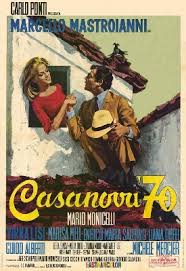
CASANOVA ‘70
Italy, 1965, 125 minutes, Colour.
Marcello Mastroianni, Virna Lisi, Marisa Mell, Michele Mercier, Enrico Maria Salerno.
Directed by Mario Monicelli.
Marcello Mastroianni had made a big impact in Italian cinema in the late 1950s with La Dolce Vita and consolidated it in the first half of the 1960s with 8½, Divorce Italian Style, Marriage Italian Style, Yesterday Today and Tomorrow. This film was made in the mid-60s by veteran writer-director Mario Monicelli.
Monicelli was still writing films at the age of ninety-one in 2006. His wide range of films include popular comedies like Lovers and Liars with Goldie Hawn and Mortadella with Sophia Loren.
This film was an update of the Casanova story, focusing on a major played by Marcello Mastroianni who goes to a psychiatrist to discuss his problems. However, the psychiatrist has an agenda of his own and twists the consultations with the major. A number of popular Italian actresses at the time, led by Virna Lisi, are in support.
The film was written by Suso Cecchi d'Amiko, a veteran writer of many of the outstanding films of the Italian cinema including The Inquiry, and many of the films of Visconti including The Leopard, Sandra, The Outsider and Metello.
1. Why was this film made for Italian audiences? Was it made for international audiences? What would be the different response? Why? What was the basic reason for making this film? Its satire? The updating of Casanova to the modern age? How humorous was this? How serious?
2. Comment on the opening of the film with its light-heartedness. The solemn situation of a Paris army parade, the sexuality, the male? What did the film portray about the personality of Casanova? Marcello Mastroianni’s personality?
3. How successful was the structure of the film? The commentary about the hero, his anguish and problems, the visit to the psychologist and the subsequent diary, the exploits of the modern Casanova and retribution with the reprisal of the characters we had met at the beginning? How effective was this for the enjoyment?
4. Was the hero a character and a personality in the film, or a caricature? His masculinity, his talk about himself, preoccupation with potency, the impact of social conventions and traditions on him? His major concern about his sexuality? The irony in the fact that the hero could only be potent and loving with the atmosphere of danger?
5. How important was the need for the hero to be liberated? His kinks, the inhibitions because of his upbringing, would he ever find true love?
6. The satire on the situation with the police and their attitude? His relationship with his girlfriend at the start, his invading her room? The way that this was used again at the final court-case?
7. The satire on the psychologist and his treatment of the hero? His getting him to talk about his dream - the humour and significance of the flashbacks and their insight into the hero and his inhibitions? The odd behaviour of the psychologist, later taken up in the court-case and his anti-women attitudes? What value did the psychologist have for the hero? especially in his diary?
8. What attitude did the film take towards the women? The girlfriends? The lion-tamer? Gigliola? How attractive a heroine was she? Her initial reactions to the hero? Her final reactions? The prospect of a happy marriage?
9. How satirical was the presentation of the diary? How did it help the hero? How did it satirise his problem? How did it satirize the modern Casanova?
10. Did the film change dramatically with the introduction of the Count? The irony of his attitude towards the hero? The irony of his death? Did this add to the plot or was it merely the occasion for the final court-case?
11. The satire in the court-case and the stances and points of view put forward? How effective satire was this?
12. Had the hero progressed by the end of the film? The irony of his love for Gigliola? The need still, to be daring? (Gigliola’s phone call and attitude towards her husband?)
13. How successful a comedy was this? How successful would it be for Europeans to laugh at themselves and their attitudes? For wider audiences?
Published in Movie Reviews
Published in
Movie Reviews
Tagged under
Saturday, 18 September 2021 19:22
Carrington V.C.
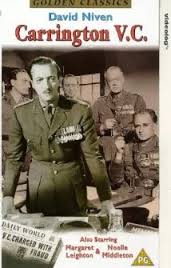
CARRINGTON V.C.
UK, 1955, 105 minutes, Black and white.
David Niven, Margaret Leighton, Noelle Middleton, Alan Cuthbertson, Victor Maddern, Geoffrey Keen, Mark Dignam, Maurice Denholm, Lawrence Naismith, Clive Morton, Michael Bates.
Directed by Anthony Asquith.
Carrington VC is a very British film. It was directed by Anthony Asquith, son of the prime minister of England, who made many feature films during the 40s to the 60s, many of them celebrated like The Way to the Stars as well as The Winslow Boy. He also directed such films in the 60s as The Yellow Rolls Royce and The VIPs.
The film presents David Niven in a very typical role – one which could be compared to his Oscar-winning major in Separate Tables three years later. Margaret Leighton appeared in many British films as a strong character – sometimes neurotic. There is a gallery of British character actors in support.
The film is basically a court-martial, a courtroom film. It presents quite a number of moral dilemmas. David Niven portrays Major Carrington who has been promoted but has entangled himself, especially in his financial difficulties as well as an extramarital relationship. As he is accused in court of embezzlement, he tries to defend himself but the difficulty is that a witness to what he did is the prosecutor, his commanding officer, and he needs the support of his wife. However, this will lead to the revelation of his affair.
David Niven is able to convey both strength and weakness in his characters and this is a very strong portrait study of a flawed man.
1. What retained interest in this film? The Court Martial drama? The human interest?
2. What did the film have to say about judgments and evidence? Audience judgment on Carrington changing impressions? The Tribunal's judgment on him? The inter-relation of law, justice, humanity?
3. How important was the British background and style of this film? How important the Army background with its laws and styles and precision? The army as giving a view of modern society and its attitudes towards justice? What comment on army life was being made via this film – the influence of its styles and precision on ordinary human behaviour, the conflicts inevitable in power struggles and confrontations, jealousies etc.? How much insight was given into this conflict?
4. Was Carrington an interesting hero in himself? Carrington as a man, his relationship to Valerie, his past career and support of her, his love for his wife, his relationship with Captain Graham, his desire for integrity? The importance of the question of his back pay and his appeals and his desperate situation? Did his aristocratic background help him or hinder him, his racing, slander by Henniker, being made a victim? How much dignity was there in his character, how honourable and courteous, towards the army, his wife, bearing in the trial and his defence? The quality of his speeches in communicating his character?
5. How important for the film was the loyalty of the sergeant to Carrington? What motivated him? Hero-worship? Bending the law for him?
6. How important was Captain Graham for the plot? As a typical army woman? Her loyalty and support of Carrington? Her love for him - were you surprised at their affair?
7. The dramatic importance of Valerie for the film? Her life with Carrington, the questions of pay, her neuroses? Her appearance and rather sumptuous style? Her selfishness and her testimony? Audience response to her? Her manipulation of truth and falsity? Her asking Carrington not to humiliate her and his compliance with her request? The bitterness of her resentment about the affair? The harshness of her lying? What insight into malicious character and selfishness did this give?
8. The dramatic importance of Henniker In the film - the class distinctions, the jealousy, his telling of lies, his snooping behaviour and catching Carrington? His reputation with the people and the Tribunal? Audience response to his behaviour at the trial? What insight into this kind of character and his suspicions did the film give?
9. What was the overall impact of the film on questions of justice, the letter of the law, the letter of the law crushing individuals, encouragement? The personalities on the tribunal and their discussions amongst themselves? The reasons for their attitudes? Personal views confronting circumstantial evidence and the influence on decisions?
Could the members have given any other verdict?
10. The significance of the ending - Carrington and his appeal? The fortuitous nature of overhearing the telephone call?
11. What insight into character and human behaviour did the film give? Was it a worthwhile exploration of character and confrontation?
Published in Movie Reviews
Published in
Movie Reviews
Tagged under
Saturday, 18 September 2021 19:22
Carnival in Flanders/ La Kermesse Heroique
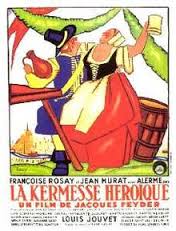
LA KERMESSE HEROIQUE (CARNIVAL IN FLANDERS)
France, 1935, 110 minutes, Black and white.
Francoise Rosay, Micheline Cheirel.
Directed by Jacques Feyder.
Carnival in Flanders was made in France in the mid-thirties. It has the reputation of being the most successful French film of its time and was widely seen throughout the whole world. It in a light-hearted. look at the French at the Spanish occupation of a town in Flanders in 1616. It pokes fun at attitudes of cowardice and courage, relationships between men and women and in a forerunner of the slogan 'Make love not war'. Directed by Jacques Feyder, it starred his wife Francoise Rosay.
1. The status of this films its reputation as a classics its impact in its time, now?
2. The film as representing film making styles in France in the thirties: black and white photography, sets, costumes. crowd scenes, style?
3. The significance of the title? The carnival atmosphere? The straightforward meaning, the ironic tones?
4. The audience's introduction to the town of Boom? Its appearance, buildings, atmosphere of the early 17th century, the overtones of Flemish culture? The occupations of the inhabitants, the personalities and styles of the people? The rulership of Spain and occupation? Ordinary citizens going about their way of life, the Military? Fear, courage, cowardice? Love? Innocence and experience?
5. The presentation of 17th century Flanders with its background of political the way of life of the ordinary people, the horror of war and the potential rape and slaughter? The importance of the atmosphere of Breughel and painting?
6. The presentation of the town in peace timet the elders of the town, their being painted and their squabbles amongst themselves, arrogance towards Breughel? Pomposity? The butcher who was late? The painting and the atmosphere of the posing and the portrait? The introduction of the marriage plans - the burgomaster and his contracts with the butcher, Breughel and his courting the burgher master’s daughter? The presentation of home life at the burgher master’s home? The status of the aristocracy in the town and their style? Glimpses of the markets and people about their daily work?
7. The portrait of the relationships between men and women? The ironical look at marriage, at the family, at ruling the town, the control of the men and their disregard of the women, the women taking over from the men and succeeding?
8. The change of tone as the three Spanish riders arrived? Their repercussions of the styles and themes of the film? The importance of the fear and the slaughter and rape an visualized for the burgher master and his council? Their plans?
9. The humour in portraying the men with their plans and tactics and the exclusion of the woman?
10. The contrary with the women and their plans and excluding the men?
11. The developing relationships during the Spanish occupation, questions of morals, moral ambiguity?
12. The portrait of the Spaniards: the Duke and his culture, the Chaplain and his background of the Inquisition and his hypocrisy? The dwarf and his money? The personalities of the various men, their womanizing, the soldier with his needlework? The greeting on the part of the women, the effect on the Spaniards, the ritual and the respect for the dead. Spanish courtesy and decorum? The success of the occupation in terms of order and decorum? The personal repercussions on the Spanish soldiers, drinking and meals, loneliness, sexuality? The repercussions on the women of Boom? The jealousy of the men?
13. The portrait of the woman of the town - the burgomaster’s wife and her control, the ladies in attendance? The innkeeper's wife and her moving from room to room for sewing and drawing the curtains? The fishmonger's wife and her giggling at death, weeping at the wedding, regret that there had been no rape? The various wives and the women at the tavern?
14. The tones of French farce, the burgomaster and pretending to be dead, his hunger and jealousy? The visits of the Duke and the various Spaniards and the discovery of the dwarf? The bribes etc.? The attack on the Duke by the butcher and the burgomaster? How well did the farcical elements blend with the overall tone?
16. The portrait of the burgomaster’s wife? Her role in the house, hold, her control of her husband, her abusing him especially as regards the marriage? Her various ploys to control the women, welcome the Duke, hospitality and billeting? Her entertaining, the poetry and the walking in the summer night, arranging the marriage for her daughter? Her visit upstairs - to the Duke? Being discovered with her children by her husband?
16. The contrast with the burgomaster and his tears? The happy resolution with the declaration about freedom from taxes?
17. The critique of the Church and the Inquisition with the personality and behaviour of the Chaplain - as regards his eating and drinking, attitudes towards chastity, towards poverty?
18. The mood of the ending with the pomp and circumstance of the Spaniards leaving? The theme of peaceful occupation rather than slaughter?
19. The tone of French farce, costume French farce, ambiguity of morals, basic message?
Published in Movie Reviews
Published in
Movie Reviews
Tagged under
Saturday, 18 September 2021 19:22
Carmen
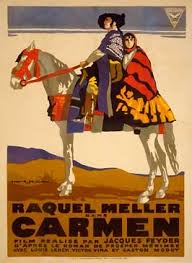
CARMEN
France, 1926, 110 (170 restored) minutes, Black and white.
Raquel Meller.
Directed by Jacques Feyder.
A French silent film of the late twenties. It was directed by Jacques Feyder, a French film-maker with a solid reputation who filmed in the United States (The Kiss, 1929) and in Great Britain (Knight Without Armour, with Marlene Dietrich and Robert Donat, 1937). This film is a straightforward presentation of Prosper Merimee's story. It is much better known in its operatic form by Georges Bizet. It was adapted by Oscar Hammerstein for the American version set in World War II, Carmen Jones (filmed by Otto Preminger in 1954). The film is an interesting example of French film making of the twenties and of the French style with the impact of visuals, elaborate and melodramatic silent acting styles.
1. The popularity of Merimee's story? The basic ingredients of the gypsy woman, her tempestuous love, the trail and violence? The operatic nature of the material and its being used by Bizet? Later treatments of Merimee and Bizet - and the American adaptation, Carmen Jones?
2. The work of Jacques Feyder, especially in his sound films? French sensibility?
3. The impact of silent films, black and white photography, editing, sub-titles, expressive and heightened acting styles? In their time, now?
4. The film's capturing the atmosphere of Spain? The city, countryside, smugglers? The military barracks, factories, the bull fights?
5. The focus on Jose - his temper, relationship with his mother, soldier, corporal, the fight for Carmen? Carmen's infatuation? Smuggling? Doncairo? Jealousy, violence? Murder and surrender? Tragedy? The possibility of depth in these themes in silent films?
6. Carmen as a woman, gypsy, Spanish? the gypsies and fate? Fighting? Relationship with Jose? Her choices? The picador, death?
7. The quick sketching of Dancairo? Their place in the melodrama?
8. The presentation of the arena, bull fights, the picador?
9. The conventional material - how well handled? Audience expectations for silent films and the presentation of conventions? Men and women, love and passion, violence and death?
Published in Movie Reviews
Published in
Movie Reviews
Tagged under
Saturday, 18 September 2021 19:22
Caretaker, The
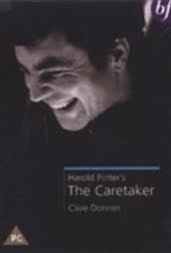
THE CARETAKER
UK, 1963, 105 minutes, Black and white.
Alan Bates, Donald Pleasence, Robert Shaw.
Directed by Clive Donner.
The Caretaker is a film version of a play by Harold Pinter. Pinter emerged on the London theatre scene during the 1960s with plays like this and including The Birthday Party and The Homecoming. He was to continue writing for the theatre for the next forty years. However, he also wrote a great number of screenplays as well. Sometimes he appeared in films as an actor (as in Wit with Emma Thompson).
The film introduces Pinter’s verbal style to the audience. It is full of enigma, pauses, non sequiturs. It is existential in the same way that the work of Samuel Beckett is existential. The parallels with Beckett are very interesting in terms of the use of language, pause, accents, modulation.
The film is interesting in that it is a three-hander, the interaction between very strong screen and stage personalities, Alan Bates, Donald Pleasence and Robert Shaw. An opportunity to see them at the beginning of their careers.
Direction is by Clive Donner who worked in British television in the 50s. During the 1960s he had the opportunity to make a number of films including Frederick Raphael’s acidic Nothing But The Best, Woody Allen’s comedy What’s New, Pussycat, the sex comedy Here We Go Round The Mulberry Bush and the epic drama Alfred the Great. However, during the 1970s and 1980s he spent most of his career making telemovies, a number of which were remakes of classics like A Christmas Carol, Oliver Twist, King Arthur. The film won the Silver Bear for Clive Donner at the Berlin film festival of 1963.
1. Audience interest in the plays of Harold Pinter, their style and themes? How would the world of Pinter be best described? An interior and subjective world? The situations of this world, the characters and their interplay. the importance of words and of silences, actions and their symbolism?
2. The impact of the caretaker in theatre? The confined world, the words, the small number of characters and their interaction, their presence to a theatrical audience? The kind of response that they elicit?
3. How well was this transferred to the screen? The cinematic presentation of the Caretaker, the kind of response? The confinement of the world of Pinter to the room, the house, the yard, the scenes outside the house? How theatrically was the world presented? The presentation of the characters in cinema form, close-ups etc.? The importance of the dialogue and the silences? The importance of cinematic touches, editing. close-ups. tracking camera, flashing editing an for instance the scene with the knives, the shocks?
4. The importance of the limited number of characters and the confinement of the scenes? The claustrophobic impact and response?
5. The significance of the title and the focus on Davis? The attitude of the two brothers towards a caretaker? The house as needing a caretaker?
6. The film's focus on Davis: the explanation of his background, the way that he appeared at the start and the incidents in which he had been involved, his appearance and poverty, squalor, age? The fact that he was grateful for being rescued by the elder brother? How ordinary a person was he? Did he see himself as an ordinary person? His response to kindness? His fear of the younger brother? The way that he could be dominated? His dreams and hopes, their reality and unreality? His sense of dignity and pride despite his appearance? The importance of his documents being at Sidcup? The younger brother's driving him there and around the block? His gradual playing up to the various brothers, cowering under the violence of the younger brother? His ultimate bewilderment in not knowing what to do? The fact that he was a traitor, betraying the kindliness, the plea to the older brother and his finally not being heard? His being bewildered by both of them? Details such as his pipe, his sleep, noises in his sleep and nightmares, his racist attitudes towards the Indians, his willingness to work etc.? What insight into human nature through this character?
7. The presentation of the older brother: his kindness and rescuing Davis, the extent of his help, the incident with the shoes, the bed? Kindly, understanding and listening? A gentle manner? The offer of the job of caretaker? The way that he got on so well with Davis? How well did he relate with his younger brother? The sequence of his telling his story? His being betrayed by Davis and their clash? His refusing to listen to his plea and the film ending with this? What values and human attitudes did he represent? The importance of such detail as the shed, his bed, the room? His sense of privacy and ownership? Insight into human nature?
8. The character of the younger brother: his appearance during the film's credits, the sinister appearance in the house, his involvement with the plot, his bullying of Davis, the threats of violence? Why did he not live in the room? His attack, the incident with the knives? His dreams, mocking Davis, playing with words, mocking his older brother an being mad? His using Davis, the trip round the block? Building up a friendship and yet undermining it? The sequence in the restaurant? The job of caretaker? His turning on Davis and bullying him? His violence eliciting the response of subservience, his then abandoning Davis? The bewildering aspects of his personality? What insight into human nature?
9. What kind of a world was this enclosed world? How pessimistic? What was necessary to survive in ouch a world?
10. The quality of the exploration of relationships, an revealed in situations, in words, in silences, in symbolic actions? Themes of power and control?
Published in Movie Reviews
Published in
Movie Reviews
Tagged under